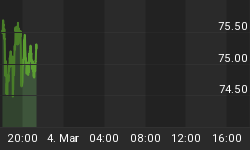08:40 EST, Fri 17 July
Gold Beats Short-Term Forecast, Up 2.1% on Week, as US Housing & Banks Beat the Street
THE PRICE OF PHYSICAL GOLD slipped into the New York opening on Friday, easing back $2 from a London AM Gold Fix of $934.50 an ounce as global stock markets ticked higher for the fourth session this week.
Crude oil held onto Thursday's bounce above $62 per barrel. US government debt prices rose, pushing the yield on 10-year Treasuries down to 3.45%.
Citigroup and Bank of America joined Goldman Sachs and J.P.Morgan in reporting better-than-expected earnings for the second quarter of 2009.
New US housing starts and permits also beat analyst forecasts, up more than 7% on June's data from May.
"Overall, the dominant situation for Gold right now is the summer holiday," said trading manager Dick Poon at the Hong Kong office of metal-refinery Heraeus to Reuters earlier.
"It is also a quiet season for manufacturing. There is not so much demand in the market."
Eighteen out of 32 professional gold-market traders and analysts today told Bloomberg News today that Gold Prices will rise next week, adding this week's 2.1% rise.
Last Friday, 21 out of 32 professionals told the newswire that gold would fall by today.
"We believe an upside close outside this range [of $925-943] is needed to bring in fresh gold buying," says the technical note from Scotia Mocatta.
"If we can take out 943 then we should see 960 and potentially 990. The 100-day moving average at 925 should act as a minor support on any pullback."
Tokyo Gold Futures ticked lower on Friday, but ended the week 3.6% better as the Nikkei stock index added 1.2%.
Forex markets were mostly unchanged for the day, leaving the Euro up 1¢ and ¥3 from last Friday's finish at $1.41 and ¥132 against the US and Japanese currencies respectively.
But British investors looking to Buy Gold saw the price touch an 8-session high of £575 an ounce as Sterling dropped 2¢ from Thursday's two-week highs above $1.6450.
Italy's proposed tax on its own central-bank gold reserves meantime threatened to jeopardize the government's entire "anti-crisis" budget after the parliamentary speaker objected to cutting the rate from 6% to 1% of capital appreciation.
Aimed at helping to close a 2009 deficit worth more than 5% of GDP, the €250 million hit to the Banca d'Italia has met fierce opposition from the European Central Bank (ECB) in Frankfurt.
Zimbabwe today raised its annual budget by 22% to US$1.2 billion, slapping a new 3% levy on local Gold Mining companies but failing so far to give full details.
The country's gold-mining output now accounts for one-third of all exports. It dropped by 49% in 2008 to a 90-year low, while the central bank printed money to support government spending, stoking inflation estimated at 500 billion per cent by South Africa's Times in Johannesburg.
"Government deficits, mainly the result of automatic stabilizers [such as unemployment benefits] rather than discretionary policy, are the only thing that has saved [the United States] from a second Great Depression," says Princeton professor Paul Krugman on his New York Times blog.
"All indications are that deflation has been successfully fended off - so far, at least," says the Curious Capitalist blog at Time magazine after Thursday's strong US consumer-price data.
"The weakening US Dollar from 2002-2008 led to higher global liquidity and higher asset prices like stocks," says Steven Barrow at Standard Bank in London. "This came to a crashing end in mid 2008 but there are signs that it could be building up again.
"Add this to the growing evidence that US investors are sending more money into foreign markets again and it looks as if this association between stronger stocks and a weaker dollar could have further to run."
Citing support for Gold Prices at $920 - and pegging resistance at $944 - Barrow's colleague Walter de Wet says "the main event" next week will be Federal Reserve chairman Ben Bernanke's testimony to the Senate about "how and when" he'll move to reduce the liquidity pumped into the financial system since the crisis began two years ago in August.
"We do not foresee any rush to drain liquidity," says de Wet. "The liquidity created by central banks globally...has merely filtered through to the financial markets. Should Bernanke indicate that large-scale draining is unnecessary, precious metals should benefit."















